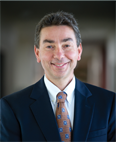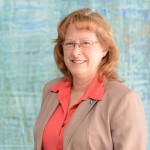
Assembly/Caucus
An Accreditor’s Crystal Ball: Challenges for Continuing Higher Education
As a chief component of self-regulation in higher education, regional accreditors are charged with evaluating college and university programs of study for their academic coherence, their assessment of student outcomes, and their adherence to best practices in governance and fiscal integrity. But accreditors are also criticized for being obstructive to innovation, called a “cartel” of peer reviewers who are not accountable to students or parents. This session will address these concerns and look ahead to the challenges facing continuing higher education in light of the possible changes to the reauthorization of the Higher Education Act.
Jeff Rosen, Vice President for Accreditation Relations and Director of the Open Pathway at the Higher Learning Commission
 Bio
Bio
Jeff Rosen is Vice President for Accreditation Relations and Director of the Open Pathway at the Higher Learning Commission, the country’s largest regional accreditor of colleges and universities. He has helped to set policy and define the approval protocols used by the Commission for direct assessment competency based education and has been involved in the assessment of alternate sources of credit, including prior learning assessments; certificates, badges, and MOOCs; and third-party providers. Prior to the Commission, he served as a research university dean of continuing and professional studies, a professor of art history at an open admissions art school, and as a community college Trustee. He has been active in UPCEA for many years, serving as Chair of the Leadership and Strategy Network; the Futures and Markets Commission; and the Frandson Book Award Committee.
Assembly/Caucus
The Context of Change
Those of us who work in higher education literally feel that change is afoot, and we see many signs of it, including competency-based education, alternative credentials, Department of Education experimental sites, etc. These changes are not occurring in a vacuum. Many aspects of our society are changing rapidly, and the consequences of those changes are often compounded and mutually reinforcing, leading to more instability and uncertainty. In this session we will explore this broader context of change and its impact on higher education, and we will discuss how we can position continuing education units to anticipate and capitalize upon some of these changes.
David Schejbal, Dean of Continuing Education, Outreach and E-Learning at the University of Wisconsin-Extension.
 Bio
Bio
David Schejbal is dean of Continuing Education, Outreach and E-Learning at the University of Wisconsin-Extension. The division works with all 26 campuses in the University of Wisconsin and with UW System Administration to increase access to programs, classes and degrees. David oversees a budget of $105M, the Higher Education Location Program, Independent Learning, an array of online and face-to-face credit and noncredit programs. David also initiated and now co-leads the UW Flexible Option. David writes and speaks broadly about the future of higher education and how that future is shaped by social, economic, technological, and political forces. In 2012, He was one of the founding members of C-BEN: The Competency-Based Education Network: A National Consortium for the Development of Higher Education Models. He currently serves on the steering committee of that group. David’s academic interests focus on issues of higher education, sustainability, and the environment. His academic background is in philosophy, and he received his doctorate from the University of Connecticut. He is the current president of the University Professional and Continuing Education Association (UPCEA) and a member of the Council of Environmental Deans and Directors (CEDD).
Assembly/Caucus
Threats and Opportunities: Higher Education in the 21st Century
The landscape of American higher education is changing rapidly, driven by issues of funding, technological change, and changing expectations. Where are the threats and opportunities in this new environment, particularly for the continuing education community? In addition to surveying the rapidly changing context, this presentation will explore the crucial leadership role that continuing education might play in helping institutions adapt and thrive in a new environment.
George Mehaffy, Vice President for Academic Leadership and Change at the American Association of State Colleges and Universities (AASCU) in Washington, D.C.
Bio
George L. Mehaffy serves as the Vice President for Academic Leadership and Change at the American Association of State Colleges and Universities (AASCU) in Washington, D.C., a higher education association representing 400 public colleges and universities and their 3.8 million students. His division is responsible for developing and managing programs for member institutions in areas such as organizational change, civic engagement, leadership development, undergraduate education, technology, international education and teacher education. He works closely with university presidents and chief academic officers on a variety of national initiatives. Each year, his division organizes a number of conferences, including two national conferences each year for AASCU chief academic officers. He has directed a series of innovative projects, including international programs with China and Liberia; a technology transformation annual conference with EDUCAUSE and the University of Central Florida; and two major national studies of student success. In 2003, he designed and launched the American Democracy Project, a civic engagement initiative involving 240 colleges and universities, in partnership with The New York Times. In 2010, he created the Red Balloon Project, a national initiative to transform undergraduate education. The most recent Red Balloon initiative, Re-Imagining the First Year of College, will begin in January 2016 with 40 participating campuses. Before coming to AASCU, he had more than twenty years of teaching and administrative experience in higher education in Texas, New Mexico, and California. He also served for 33 years in the United States Coast Guard Reserve, retiring as a Captain in 2000.
Assembly/Caucus
Interactive Session on Coordinator Strategies to Assist Instructors
This interactive session will focus on strategies and practical evaluation methods program coordinators can use to help less experienced instructors plan and conduct effective learning sessions that will enhance student performance. Informal coordinator assistance to instructors includes: summary of instructor experience and teaching style; orientation about the use of technology and interactive teaching methods; use of unobtrusive, ongoing evaluation feedback for course planning, improvement, and results; and guidelines for instructor/coordinator cooperation. The session will provide opportunities for participants to discuss connections between evaluation feedback, assistance to instructors, and potential outcomes from competency-based education.
Alan Knox
Alan’s career long interest has been lifelong learning of adults, in all of its variety, roles, and locations. He has followed this interest as a student, teacher, scholar, and administrator at five universities. This includes his university preparation, and as a continuing education administrator role at Syracuse University; faculty and research activities at Nebraska and at Columbia Teachers College; associate Vice Chancellor for continuing education and public service at Illinois; and for the past three decades at Wisconsin, with increasing emphasis on international comparative analysis, and his most recent book published by Stylus, on faculty development for outreach in the helping professions. Alan appreciates his active engagement and leadership in various countries and associations of practitioners and scholars in the field. Contributions through publications, presentations and interactions have also been opportunities to learn, such as books on international comparative adult education, on evaluation, and on strategies for improving creative professional learning activities. He looks forward to continuing to explore ways to help practitioners and scholars in the field to enhance their effectiveness, as they use their understanding of the available knowledge base, to effectively help adults learn and improve their performance and communities.
Assembly/Caucus
Culture Shock: What Today’s Generation of Digital Natives Means for Higher Education
An understanding of today’s undergraduate college students is vital to the effectiveness of our nation’s colleges and universities. This session features the results of a multi-year, multi-method research project to benchmark changes in today’s college students, involving over 5,000 college students and 300 student affairs practitioners from diverse college campuses. We will explore the similarities and differences between today’s generation of students and previous generations; the challenges and changes that digital natives and non-traditional students bring to our collegiate cultures, and the implications for professional, continuing, and online education.
Diane Dean
Diane R. Dean is Associate Professor for Higher Education Administration & Policy at Illinois State University. Her research applies organizational theory, social psychology, and policy analysis to address critical issues in college and university planning, policy and governance. Excellence and equity are themes cutting across her work.
Dr. Dean’s work has been supported by government agencies, nonprofit foundations, and education organizations, and has been published in numerous chapters, articles, and research papers. She is co-editor of Women in Academe, a book series that examines gender issues facing students, faculty, and administrators in colleges and universities. Her most recent book, Generation on a Tightrope: A Portrait of Today’s College Students (with Arthur Levine) examines the sociological changes in today’s generation of undergraduate college students, the forces shaping their experiences, and their implications for postsecondary education policy, institutional planning, classroom practices, and the co-curriculum.
Dr. Dean has received numerous honors, including a joint fellowship with the National Center for Education Statistics, the National Science Foundation, and the Association for Institutional Research; and an associate’s appointment with the National Center for Public Policy and Higher Education.
She earned her bachelor’s degree in English Literature from the University of Maryland; and her master’s degree in higher education administration and her doctoral degree in organization & leadership from Columbia University. She also holds a certificate in higher education management from the Harvard Graduate School of Education.
Assembly/Caucus
UPCEA Hallmarks of Excellence in Online Leadership: An Overview and Case Study
Online education is now critical for the future of America’s universities. These institutions can no longer establish a presence in this arena without a concerted institutional strategy and structure to accomplish this now major undertaking. These Hallmarks of Excellence are an attempt to articulate those features and principles that will create opportunities for students that far exceed anything already achieved in higher education, take pedagogy to a new level, and demonstrate the capacity of universities to be an even more vital force in our society. In this presentation, we will identify seven facets of leadership and organizational development, explore different organizational models and tapping individuals to help lead as catalysts for change.
 Bob Hansen, UPCEA
Bob Hansen, UPCEA
Dr. Robert J. Hansen was named Chief Executive Officer of the University Professional & Continuing Education Association in September 2010. He previously served as Associate Provost for University Outreach at the University of Southern Maine, a regional public university serving 10,000 students. Prior to that position, he spent six years at Saint Xavier University of Chicago as Assistant to the President & Secretary of the Corporation, and then as founding Executive Director of Orland Park Campus & Off-Campus Programs. Hansen also previously served as an education policy aide in the administration of former Illinois governor, Jim Edgar.
Hansen earned a B.S. in Psychology from the University of Illinois, an M.A. in English Language and Literature from the University of Michigan, and a Ph.D. in English from the University of Notre Dame.
 Ray Schroeder, University of Illinois-Springfield and UPCEA
Ray Schroeder, University of Illinois-Springfield and UPCEA
The founding director of the Center for Online Leadership, Ray Schroeder, is widely recognized as one of the world’s leading experts in online education. As both a faculty member and administrator, Ray brings both deep knowledge of and a passion for advancing the field of online education—its potential to transform institutions struggling in the new economy, its role in expanding access for time- and distance-challenged students, and its capacity to revolutionize teaching and learning.
Ray has been engaged in online learning since 1997. He has built a very successful program with more than 20 online degree and certificate programs at the University of Illinois Springfield. Ray is well-known nationally as a leader in the field, annually delivering more than two dozen keynote addresses and invited conference presentation. He regularly publishes articles, book chapters, and the very popular daily Online Learning Update, Educational Technology and the Professional, Continuing, and Online Education Update blogs. Thousands of leaders and professionals in the field follow Ray’s blogs and tweets on a daily basis. Schroeder is the inaugural recipient of the prestigious A. Frank Mayadas Leadership Award and the 2012 Innovation Fellow for Digital Learning by the UPCEA. Most recently, he has founded the UPCEA Center for Online Leadership.
 Vickie Cook, University of Illinois-Springfield
Vickie Cook, University of Illinois-Springfield
Vickie Cook is the Director of the Center for Online Learning, Research and Service (COLRS) and Associate Research Professor in the College of Education at the University of Illinois Springfield.
Dr. Cook has been actively engaged providing consulting and faculty development with educational leaders across the U.S. and in Mexico. Her work has been published in a variety of national educational publications. She worked as part of a team that authored the UPCEA Hallmarks of Excellence.
Her current research agenda focuses on two areas. First, exploring mobile learning through a heutagogical lens and also the impact of a systems approach for online leadership. She teaches online in the Teaching English as a Second Language concentration of the Masters of Arts in Education program at University of Illinois Springfield.
Dr. Cook has served on several regional and national committees, as well as having been a long time member of Illinois Council on Continuing Higher Education (ICCHE) serving in multiple roles on the Executive Board and currently serves as President of the organization; a member of the University Professionals & Continuing Education Association (UPCEA); serves as a mentor for the Association for Continuing and Higher Education (ACHE); is a member of the Online Learning Consortium (OLC) and serves on program steering committees for the OLC Annual Conference and Midwest Collaborate conference.
Assembly/Caucus
Educating Millennials or Being Educated by the Millennial?
Millennials are growing in workforce numbers and will play an even greater role in not only household decisions but also in the workplace and in redefining cultural, political, and technological values. They will reshape our economy and our education systems. This interactive session has been designed to provide the higher education leader and marketer with new data, trends, insights, updates, and research on this growing and complex economic and political force of our society and how they will impact how we design and deliver education and knowledge to them.
 Jim Fong, UPCEA
Jim Fong, UPCEA
Jim Fong has more than twenty years experience as a marketer and researcher in the higher education community. Prior to joining UPCEA’s Center for Research and Marketing Strategy, Jim worked as a higher education strategic marketing consultant and researcher for two firms and prior to that was the Director of Marketing, Research and Planning for Penn State Outreach where he played a major role in program development research and marketing department transformation. While at Penn State, he was responsible for managing teams of marketing planners, competitive analysts, market researchers and enrollment management staff.
Over the years, Jim has taught graduate and undergraduate marketing and research classes for Drexel University, Penn State University, Duquesne University, Framingham State University and The University of Vermont.
Prior to his career in higher education, Jim worked as director of research for a large advertising and marketing agency in New England and director of analytics for what was the nineteenth largest global research company at the time. He has authored a number of publications on the marketing of online education, new program development and the organization of marketing departments.
Jim holds an M.B.A., an M.S. in Applied Statistics and a B.S. in Mathematics, all from The University of Vermont.